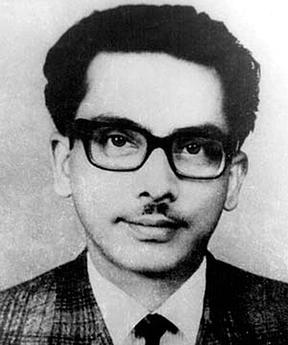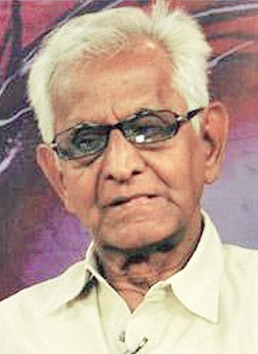Related Research Articles

The Bangla Academy is the official regulatory body of the Bengali language in Bangladesh. It is an autonomous institution funded by the Government of Bangladesh that fosters the Bengali language, literature and culture, works to develop and implement national language policy and conducts original research in Bengali. Established in 1955, it is located in the Burdwan House in Shahbagh, Dhaka, within the grounds of the University of Dhaka and Suhrawardy Udyan. The Bangla Academy hosts the annual Ekushey Book Fair.

Shahidullah Kaiser was a Bangladeshi novelist and writer. He was awarded Bangla Academy Literary Award in 1969, Ekushey Padak in 1983 and Independence Day Award in 1998.

The Bengali-language film industry based in Dhaka, Bangladesh, has been significant since the early 1970s. It is better known by the popular term Dhallywood, which is a portmanteau of "Dhaka" and "Hollywood". The dominant style of Bangladeshi cinema is melodramatic cinema, which developed from 1947 to 1990 and characterizes most films to this day. Cinema was introduced in Bangladesh in 1898 by the Bradford Bioscope Company, credited to have arranged the first film release in Bangladesh. Between 1913 and 1914, the first production company, Picture House, was opened. A 1928 short silent film titled Sukumari was the first Bengali-produced film in the region. The first full-length film, The Last Kiss, was released in 1931.
Sarah Begum Kabori was a Bangladeshi film actress and politician. Her notable films include Sutorang, Sareng Bou, Abhirbhab, Shat Bhai Champa, Sujon Sokhi and Lalon Fokir. She received the Bangladesh National Film Award for Best Actress for her role in the film Sareng Bou (1978) and Lifetime Achievement Award in 2013.

Abdullah Al Mamun was a Bangladeshi playwright, actor, and filmmaker. He earned the Bangla Academy Literary Award in 1978 and the Ekushey Padak in 2000 from the Government of Bangladesh. As a filmmaker, he won Bangladesh National Film Award for Best Director twice for the direction of the films Ekhoni Somoy (1980) and Dui Jibon (1988).

Syed Hasan Imam is an actor, film director, television director and cultural personality in Bangladesh. He earned Ekushey Padak (1999), Independence Day Award (2016) and Bangladesh National Film Award for Lifetime Achievement (2014). He was part of Swadhin Bangla Betar Kendra during the Bangladesh Liberation War in 1971. He became an honorary fellow of Bangla Academy in 2010.
The Bangladesh Freedom Party is a party founded by Colonel Khandaker Abdur Rashid, Colonel Syed Faruque Rahman and Major Bazlul Huda, the chief conspirators of the killing of Sheikh Mujibur Rahman on 15 August 1975.

Akbar Hossain Pathan Dulu, known by the stage name Farooque, was a Bangladeshi actor, politician, businessman and producer. He was known as 'Mia Bhai' to mass people. He appeared in over 150 films in a career spanning more than five decades. Most of his films were commercially and critically successful. Farooque was one of the most recognizable stars of the classical and golden era of Bangladeshi film industry.

Nazmul Huda was a Bangladeshi barrister and politician. He served as the minister of information (1991–1996) and the minister of communications (2001–2006) of the government of Bangladesh. He was a four-term Jatiya Sangsad member representing the Dhaka-1 constituency. He was a member of Bangladesh Nationalist Party since its inception until 2012 when he left the party as its vice chairman.

Nazmul Huda Bachchu was a Bangladeshi film and television actor. He won Bangladesh National Film Award.
Noyonmoni is a 1976 Bangladeshi film starring Farooque and Bobita opposite him. She garnered Bangladesh National Film Award for Best Actress for her performance in the film. It also stars Rowshan Jamil and Anwara.
Sujon Sokhi is a 1975 Bangladeshi film directed by Khan Ataur Rahman. The film received critical acclaim, particularly for the performance given by Kabori Sarwar, who won Bachsas Award for Best Actress. Both Sabina Yasmin and Abdul Alim earned Bangladesh National Film Awards for the song "Sob Sokhire Par Korite". The film was popularly remade in Bangladesh in color by director Shah Alam Kiran starring renowned duo Salman Shah and Shabnur in 1994 with the same title. It was also remade in West Bengal (India) in 1995, which was directed by Swapan Saha.
Ka Kha Ga Gha Umo is a 1970 Pakistan film directed by Narayan Ghosh Mita. Razzak and Kabari Sarwar plays the lead roles.

Ghuddi is a 1980 Bangladeshi romantic drama film directed by Syed Salahuddin Zaki, who also wrote story, screenplay and dialogue. It is the first film directed by Salahuddin Zakir. Subarna Mustafa has played the main role in film with Raisul Islam Asad, Nasir Uddin Yusuf, Tariq Anam Khan, Nayla Azad Nupur, Syed Hasan Imam and Happy Akhand in supporting roles.। Subarna Mustafa debuted in the film. In the film, Raisul Islam Asad was a freedom fighter in the film and he is also a freedom fighter in the real life.
"Ore Neel Doriya Amay De Re De Chhariya" is a Bengali film song from 1978 released Bangladeshi movie Sareng Bou. The song is penned by Mukul Chowdhury and is considered as one of the evergreen compositions of Bangladeshi Music. Originally composed and produced by Alam Khan and recorded on Abdul Jabbar's voice. The song is filmed on a theme where a sailor man's wife is dreaming about her husband's home coming. Farooque has acted as sailor captain in this film, who carry out the song. This film's director Abdullah Al Mamun has filmed this song's opening on a running train, second verses on a Bangladeshi Sampan and filming of the final verses has taken place on a human trail.
Mukul Chowdhury was a Bangladeshi lyricist and musical artist. He has written many songs for radio, television and more than hundreds of films including 'O Madhobi Go Theko Mor Antore,' 'Tumi Accho Sobi Acche,' 'Ek Chor Jay Chole' etc. He has also penned the song 'Ore Nil Doriya Amay De Re De Chhariya.'
References
- ↑ "Shahidullah Kaiser: Writing behind bars". The Daily Star. 6 March 2013. Retrieved 8 August 2017.
- ↑ জাতীয় চলচ্চিত্র পুরস্কার প্রাপ্তদের নামের তালিকা (১৯৭৫-২০১২) [List of the winners of National Film Awards (1975-2012)]. Government of Bangladesh (in Bengali). Bangladesh Film Development Corporation. Retrieved 25 March 2019.
- ↑ Shazu, Shah (28 August 2015). "I quit acting out of disillusionment: Farooque". The Daily Star. Retrieved 8 August 2017.
- ↑ "Actor Nazmul Huda dies at 78". Prothom Alo. 28 June 2017. Retrieved 8 August 2017.
- ↑ "Syed Hasan Imam to get Lifetime Achievement". The Daily Star. 20 January 2016. Retrieved 8 August 2017.
- ↑ "Abdul Jabbar: whose stirring songs inspired the nation in '71". The Daily Star. 21 November 2009. Retrieved 8 August 2017.